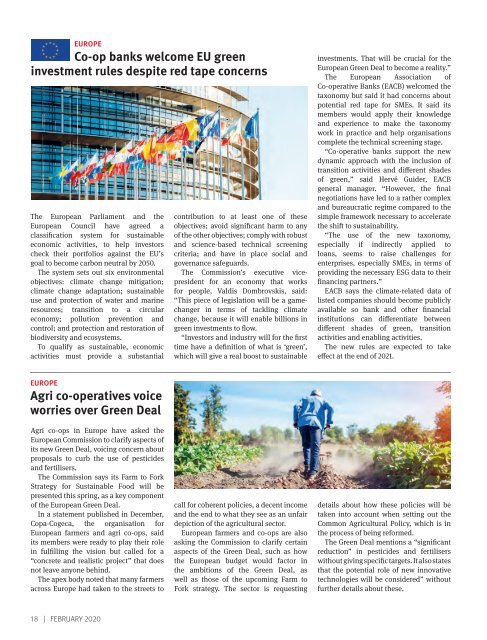Co-op News - February 2020
Co-operative Retail: ethical challenges in the modern world
Co-operative Retail: ethical challenges in the modern world
Create successful ePaper yourself
Turn your PDF publications into a flip-book with our unique Google optimized e-Paper software.
EUROPE<br />
<strong>Co</strong>-<strong>op</strong> banks welcome EU green<br />
investment rules despite red tape concerns<br />
The Eur<strong>op</strong>ean Parliament and the<br />
Eur<strong>op</strong>ean <strong>Co</strong>uncil have agreed a<br />
classification system for sustainable<br />
economic activities, to help investors<br />
check their portfolios against the EU’s<br />
goal to become carbon neutral by 2050.<br />
The system sets out six environmental<br />
objectives: climate change mitigation;<br />
climate change adaptation; sustainable<br />
use and protection of water and marine<br />
resources; transition to a circular<br />
economy; pollution prevention and<br />
control; and protection and restoration of<br />
biodiversity and ecosystems.<br />
To qualify as sustainable, economic<br />
activities must provide a substantial<br />
contribution to at least one of these<br />
objectives; avoid significant harm to any<br />
of the other objectives; comply with robust<br />
and science-based technical screening<br />
criteria; and have in place social and<br />
governance safeguards.<br />
The <strong>Co</strong>mmission’s executive vicepresident<br />
for an economy that works<br />
for pe<strong>op</strong>le, Valdis Dombrovskis, said:<br />
“This piece of legislation will be a gamechanger<br />
in terms of tackling climate<br />
change, because it will enable billions in<br />
green investments to flow.<br />
“Investors and industry will for the first<br />
time have a definition of what is ‘green’,<br />
which will give a real boost to sustainable<br />
investments. That will be crucial for the<br />
Eur<strong>op</strong>ean Green Deal to become a reality.”<br />
The Eur<strong>op</strong>ean Association of<br />
<strong>Co</strong>-<strong>op</strong>erative Banks (EACB) welcomed the<br />
taxonomy but said it had concerns about<br />
potential red tape for SMEs. It said its<br />
members would apply their knowledge<br />
and experience to make the taxonomy<br />
work in practice and help organisations<br />
complete the technical screening stage.<br />
“<strong>Co</strong>-<strong>op</strong>erative banks support the new<br />
dynamic approach with the inclusion of<br />
transition activities and different shades<br />
of green,” said Hervé Guider, EACB<br />
general manager. “However, the final<br />
negotiations have led to a rather complex<br />
and bureaucratic regime compared to the<br />
simple framework necessary to accelerate<br />
the shift to sustainability.<br />
“The use of the new taxonomy,<br />
especially if indirectly applied to<br />
loans, seems to raise challenges for<br />
enterprises, especially SMEs, in terms of<br />
providing the necessary ESG data to their<br />
financing partners.”<br />
EACB says the climate-related data of<br />
listed companies should become publicly<br />
available so bank and other financial<br />
institutions can differentiate between<br />
different shades of green, transition<br />
activities and enabling activities.<br />
The new rules are expected to take<br />
effect at the end of 2021.<br />
EUROPE<br />
Agri co-<strong>op</strong>eratives voice<br />
worries over Green Deal<br />
Agri co-<strong>op</strong>s in Eur<strong>op</strong>e have asked the<br />
Eur<strong>op</strong>ean <strong>Co</strong>mmission to clarify aspects of<br />
its new Green Deal, voicing concern about<br />
pr<strong>op</strong>osals to curb the use of pesticides<br />
and fertilisers.<br />
The <strong>Co</strong>mmission says its Farm to Fork<br />
Strategy for Sustainable Food will be<br />
presented this spring, as a key component<br />
of the Eur<strong>op</strong>ean Green Deal.<br />
In a statement published in December,<br />
<strong>Co</strong>pa-<strong>Co</strong>geca, the organisation for<br />
Eur<strong>op</strong>ean farmers and agri co-<strong>op</strong>s, said<br />
its members were ready to play their role<br />
in fulfilling the vision but called for a<br />
“concrete and realistic project” that does<br />
not leave anyone behind.<br />
The apex body noted that many farmers<br />
across Eur<strong>op</strong>e had taken to the streets to<br />
call for coherent policies, a decent income<br />
and the end to what they see as an unfair<br />
depiction of the agricultural sector.<br />
Eur<strong>op</strong>ean farmers and co-<strong>op</strong>s are also<br />
asking the <strong>Co</strong>mmission to clarify certain<br />
aspects of the Green Deal, such as how<br />
the Eur<strong>op</strong>ean budget would factor in<br />
the ambitions of the Green Deal, as<br />
well as those of the upcoming Farm to<br />
Fork strategy. The sector is requesting<br />
details about how these policies will be<br />
taken into account when setting out the<br />
<strong>Co</strong>mmon Agricultural Policy, which is in<br />
the process of being reformed.<br />
The Green Deal mentions a “significant<br />
reduction” in pesticides and fertilisers<br />
without giving specific targets. It also states<br />
that the potential role of new innovative<br />
technologies will be considered” without<br />
further details about these.<br />
18 | FEBRUARY <strong>2020</strong>


















